This article is more than 5 years old.
This year’s LOEX Conference took place in America’s “Space City,” Houston, Texas. As is true of previous years, LOEX continues to stand out as the profession’s premier library instruction conference. Overall themes of the conference included combating fake news through information literacy and gamifying the library experience. There were 385 attendees and 68 breakout sessions.
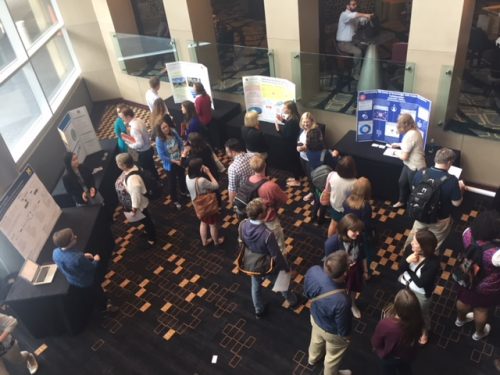
Plenary (Joy)
The LOEX planners have a knack for selecting excellent plenary speakers, and this year was no exception. The Friday morning speaker was Michelle “Mikki” Hebl, who is the Martha and Henry Malcolm Lovett Professor Psychology and Management at Rice University. She is an applied psychologist and her research focuses on workplace discrimination.
The title of her presentation was “Gender and Race Gatekeepers.” She defined “gatekeepers” as those people who ultimately decide who progresses up the leadership/power ladder. Hebl has been talking about workplace discrimination and barriers stigmatized individuals face in social interactions since 1998. If you think you have mastered this because you have attended all four of the WFU “Gatekeepers” workshops, then Hebl’s research may come as a sobering reminder that our biases run deeper than most of us would like to admit. As a researcher, she talked about the subtle discrimination shown to women wearing hijabs, pregnant women, and obese people. She talked about gender gatekeeping and words used in recommendation letters for men versus women (for example, women’s skills are more often described as “has potential” while men are more often described as having the skills needed). She talked about race gatekeeping and that many times people are left out of social networks because of the way they look. We then did an exercise where she showed up a picture of a white bear and then she told us not to think about the white bear and she proceeded to lecture about a different topic, but for most of us, the image of the white bear haunted us. Hebl described this thought suppression phenomenon as a mindbug that requires self-regulation to overcome like flexing a muscle and holding it. The same is true for overcoming our biases. She talked about how to prevent gatekeeping by awareness, motivation, modelling, confronting, and advocating for policies and laws. If you would like to hear Michelle Hebl speak, I recommend her website and I suggest that you click on her TedX talk which is linked on the bottom right of her homepage.
Fake News, Lies, and a For-credit Class (Joy)
One of my favorite breakout sessions was led by Jo Angela Oehrli who is at the University of Michigan. Jo Angela generously shared this link specifically designed for LOEX attendees that included all of the elements (syllabus, lesson plans, slides, and assignments) of this seven-week, one credit fake news course. Roz and Hu, I believe you will find this to be particularly interesting in light of your Freshman Seminar proposal. They have taught this course for three semesters with 12-15 students in each section, all sophomores or above. They used critical thinking exercises and active learning activities such as news stories that encouraged in-class discussions (class participation was a third of the course grade). The syllabus was flexible to allow for current news examples from a variety of perspectives. What is not in the news is as important as what is in the news, and if this idea interests you, I suggest that you compare some of the content of CNN, MSNBC, and FOX. She ended by saying that one of the biggest challenges is helping the students become comfortable with ambiguity. By the end of her presentation, I was ready to sign up for this course!
The Library as a Playground: Escape Rooms and Gamifying a For-Credit Class (Joy)
One of the things I like about LOEX is the emphasis on active and engaged learning. At the University of North Alabama, librarians are using the Escape Room model for their First Year Experience students (1,100 freshmen), to replace their previous Library Scavenger Hunt. The presenters for this breakout session developed an Escape Room experience tailored to the LOEX attendees attending that session. We were sent to tables that included locked boxes and numerous clues including menus, maps, pictures, and hints. The librarians in the group familiar with Escape Rooms quickly dove in. We made a breakthrough when we figured out how to unlock the box with the ultraviolet light flashlight, and that helped us discover clues that helped us get the right combination to open the final box. It was fun, but this approach is a serious investment of time and money. The Escape Room kits they use are from Breakout EDU and 6 kits can be purchased for $800.
The other gamification session I attended was presented by Stephanie Crowe who is at UNC-Wilmington. Stephanie used the board game “Pandemic Legacy” in a one-hour credit course to introduce health science students to the research topics about epidemics and cultural issues related to health. While the students enjoyed the game and the discussions, she was very honest and said that the game was of more interest to the students than the research process and that it was difficult trying to tie the experiences together.
More Gamification! And Applications for Library Outreach (Meghan)
Continuing with the theme of gamification at this year’s LOEX, I attended “Search & Destroy: A New Game for Database Instruction and a New Model for IL Game Design” and “Unlocking Student Engagement: Success and Failure in Redesigning a First-Year Library Orientation”.
Search & Destroy is a competitive, multiplayer card game that teaches/engages database search skills (search string design, keyword selection, basic boolean, faceting, etc.). Mari Kermit-Canfield and Gary Maixner, two librarians from Ferris State University, designed Search & Destroy using basic game design concepts (win/lose conditions, repetition and strategy development) to encourage learning. At the end of the session, we had an opportunity to play Search & Destroy in small groups and the game was engaging and did an excellent job of providing players an opportunity to apply database search strategies in a creative, fun way.
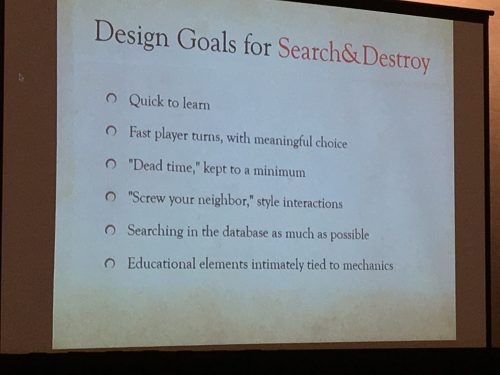
Drawing inspiration from a Pinterest post, librarians from Utah State University designed and implemented a lockbox activity for their first year library orientation program. The activity integrates a scavenger hunt (incorporating clues to engage exploration of both virtual and physical library spaces) with a treasure hunt (students use the answers to the clues to uncover a “code” to unlock the combination lock on their lockbox, and access their prize). Overall, the librarians were very pleased with the feasibility of this activity and they received positive feedback from student participants. The presenters advised spending an efficient amount of time developing the clues (and thinking strategically about the learning outcomes), as well as focusing on creating a fun experience that motivates students to return to the library.
I also attended a handful of sessions that presented interesting applications for library instruction and outreach:
- “How Do We Planet? Integrating Information Literacy into the Creative Process”
- “The Library Revolves Around the Campus: Creating Authentic Connections with Student Interests”
- “Charting Their Path: How Students Experience Using Information in their Job Search”
Here are some themes/takeaways from these sessions:
- Learn what students are working on/interested in. Be timely.
- Be authentic, and learn from your student’s experience (don’t try to sell them on something right away).
- It’s important to center the learner/student in the process. Students may need to spend some time reflecting on their own values/goals before they know what their information needs are.
Teaching Transparently and Collaboratively (Kathy)
This was my first LOEX, and there were several really great sessions that I attended (such as the one on the Fake News course that Joy wrote about), but I have chosen to highlight two. First, Beth Fuchs from the University of Kentucky gave a presentation on Transparency and Intentionality as Teaching Techniques. This is something that Kyle, Meghan, and Hu and I have been talking about a lot, as transparency is one of the driving ideas behind specifications grading, which we’ve been experimenting with in our LIB courses. She shared resources from the TILT Higher Ed project at the University of Nevada Las Vegas, which has shown that transparent teaching has a significant positive effect on students and increases their motivation and sense of agency. One particular study looked at how transparent teaching impacted underserved students, such as first-generation, low-income, and underrepresented students, and one of the study sites was at Winston-Salem State. This session gave me some new resources for developing assignments and implementing intentional teaching techniques, encouraged me to find other ways beyond grading to be more transparent and intentional with my students, even in a one-shot.
The second session I wanted to highlight was a collaboration between a history subject librarian, an archivist, and a disciplinary faculty member at Towson University in Maryland. All first year students at Towson have to take a first year seminar course, and each course is assigned a librarian. This particular course was about the US in the 1960s, and the librarian, archivist, and disciplinary faculty member all worked together to create a 5-session sequence that enabled students to interact with primary sources, particularly sources from the history of Towson University, which connected the general 1960s history they were learning about in class to the local history of the Baltimore area and the university. They used case studies, problem-based learning, and experiential learning to develop learning experiences for students to interact with primary sources. One activity that I really liked was having small groups analyze individual documents, develop a poster/infographic on a movable white board about the document, and then move the boards around to create a visual timeline of events (which, in this case, was of the history of the Black Student Union at Towson). They also used current examples as case studies, such as the controversy around a white artist’s painting of Emmitt Till at the Whitney Museum and student protests at Towson both in the 1960s and today. I would love to find a way to do something like this here at Wake.
Assessment and the Framework (Amanda)
The most interesting session I attended was on the University of Maryland library’s impressive information literacy assessment project. Using Peggy Maki’s nested assessment model for learning outcomes, the library’s Assessment Taskforce developed library-level learning outcomes that were adapted from the ACRL Framework’s threshold concepts. Then, each Research and Instruction unit (e.g. Social Sciences and Humanities, Business, etc…) developed unit-level outcomes which could be tailored by each instruction librarian into session-level outcomes.
The organization of the assessment project is a little difficult to understand, but I’ll try to explain it as best as I can. U of M is in their second year of the assessment project, which is designed to take a total of six years. The assessment project is divided into two-year increments, with two library-level learning outcomes/ACRL threshold concepts being assessed every two years. Each individual instruction librarian is only required to assess one learning outcome every other year. To do this, they may choose a single class which they wish to assess and design an assessment for it in the fall. The assessment is implemented in the spring, and the librarian must complete a reporting/reflection process that U of M has set up their LMS. The whole process was confusing to me at first, but after they explained it a couple times, I understood. It’s certainly very ambitious and impressive! It’s fascinating to see how libraries are adapting the threshold concept philosophy into traditional assessment practice.
Presentations
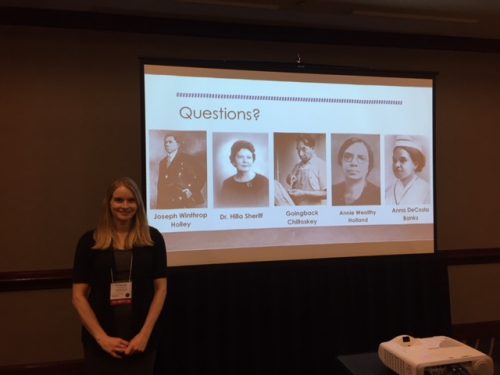
Kathy and Amanda also presented at LOEX this year.
Kathy presented with her colleague, Rebecca Lloyd, from Temple University on Speaking our Language: Using Disciplinary Frameworks to Identify Shared Outcomes for Student Success in College … AND BEYOND! [Slides available here.]
Amanda presented on Using Wikipedia as a Lens to Explore Critical Information Literacy in Library Credit Courses
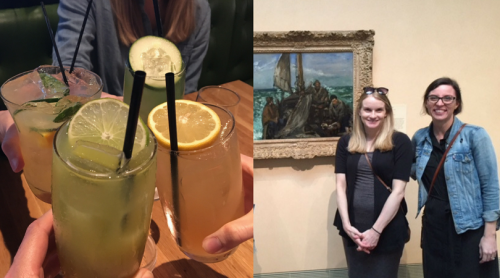
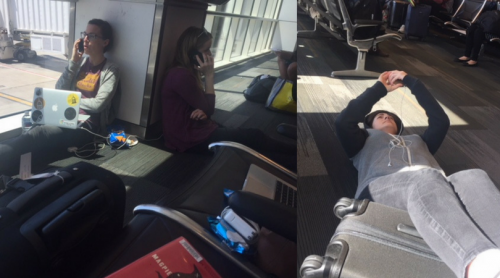

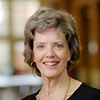
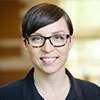
7 Comments on ‘Amanda, Joy, Kathy & Meghan @ LOEX’
Congratulations to everyone on a successful and productive conference !
Glad you all made it back and were able to write this blog 🙂 Lots of learning taking place, looking forward to seeing what comes to ZSR as a result!
You all made the most of this conference! I love the sharing of the fake news course, so interesting!
Can’t wait to see what games you incorporate.
Sounds like everyone had a great LOEX, barring getting home. 😉 While the Escape Room game would be my personal worst nightmare (seriously, how are these things fun?!), I would support *others* at ZSR implementing that here!
Other than the challenges of getting home, it sounds like this was a great conference.
Jo Angela Oehrli is on the panel I proposed for ACRL! Her class sounds amazing but so do so many of these sessions! Thanks all! Good food for summer reading!